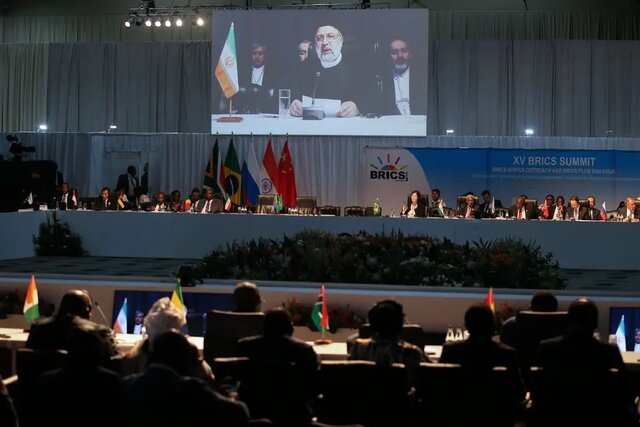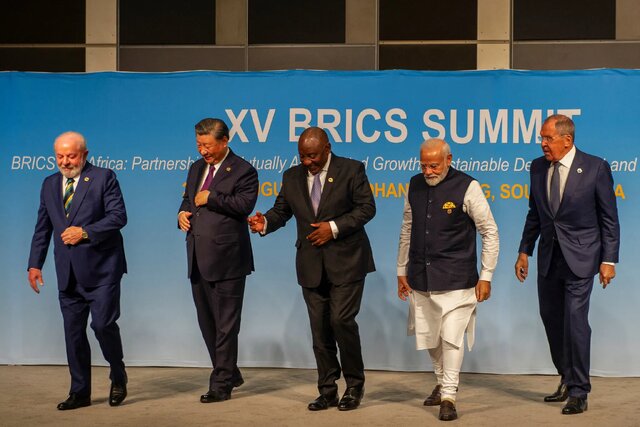Russia’s goal of hosting the BRICS meeting from the point of view of AFP
Referring to Russia’s hosting of the BRICS meeting, which is the largest meeting held in this country after the start of the war in Ukraine in the past 2 and a half years, the AFP stated that Moscow’s goal in holding this meeting was to show the failure of the West’s efforts to isolate Moscow and expand BRICS as a challenge to “Western hegemony”.
According to Isna, dozens of world leaders will meet in Russia from tomorrow Tuesday to participate in the meeting of the BRICS group, an alliance of emerging economies that the Kremlin hopes will challenge the hegemony of the West.
By publishing this article, the French News agency wrote in a report about it: This meeting will be the biggest meeting since the beginning of the war in Ukraine and with the intention of Russian President “Vladimir Putin” to show the failure of the West’s efforts to isolate it for two years and The half since its invasion of Ukraine takes place in Russia.
Among those who are going to Kazan to participate in this meeting, we can mention UN Secretary-General Antonio Guterres, Chinese President Xi Jinping, Iranian President Masoud Mezikian, and Turkish President Recep Tayyip Erdogan.
The BRICS meeting is scheduled to be held from October 22 to 24 (November 1 to 3). Russia also expects Indian Prime Minister Narendra Modi to attend the meeting.
The agenda of the BRICS meeting in Kazan
In this article, pointing out that it seems that “Moscow has made the expansion of the BRICS group one of the pillars of its foreign policy”, it is stated: the main issues on the agenda of this meeting are Putin’s proposed initiative on a payment mechanism under the supervision of BRICS as a competitor to It is the SWIFT international financial network, with which Russian banks have been disconnected since 2022 and after the war in Ukraine. Another issue will be the spread of conflicts in the West Asian region.
Agence France-Presse wrote: The Kremlin hailed the meeting as a diplomatic victory that will help build a coalition to challenge Western hegemony.
Representatives of the main BRICS countries in the previous meeting of this group
Although the United States has rejected the idea that BRICS will become a “geopolitical rival”, it has expressed concern about Moscow’s use of its military capabilities during the conflicts in Ukraine.
Moscow has continued to make progress on Ukraine’s eastern front this year, while strengthening ties with China, Iran and North Korea, Washington’s three main rivals.
Moscow’s goal of hosting the BRICS meeting
This article continues: “Konstantin Kalachev”, a political analyst based in Moscow, said that by holding the BRICS meeting in Moscow, the Kremlin intends to show that Moscow is not only isolated, but has partners and allies.
According to Kalachev, this time the Kremlin wants to show that “there is an alternative to Western pressures and that the multipolar world is a reality.”
Putin has repeatedly accused the West of “inciting” Russia to send troops to Ukraine, and has rejected the idea that its attack was carried out with imperialistic goals of territorial grabs.
The Kremlin has said it wants global relations to be guided by international rules, “not rules set by some countries, including the United States.”
“We believe that BRICS is a prototype of multipolarity and a structure for uniting the South and East Poles based on the principles of national sovereignty and mutual respect,” said Yuri Ushakov, one of the Kremlin aides.

The speech of Martyr Seyed Ebrahim Raisi, the former president of Iran, in one of the meetings of the BRICS group
He said: The gradual work of BRICS is to build a bridge brick by brick to reach a more democratic and just world order.
BRICS was initially formed with four members in 2009. Since then, this group has expanded and several other countries, including Iran, Egypt and South Africa, have joined it.
Türkiye, a NATO member that has complicated relations with Moscow and the West, announced in early September that it wants to become a member of this alliance.
According to Ushakov, the heads of the BRICS members, with the exception of Saudi Arabia, which will participate in the meeting at the level of foreign ministers, will come to Kazan on behalf of their countries. Also, the absence of “Mohammed bin Salman”, the crown prince of Saudi Arabia, has fueled speculations about the differences between these two important countries in the field of energy.
end of message
RCO NEWS
RCO

















